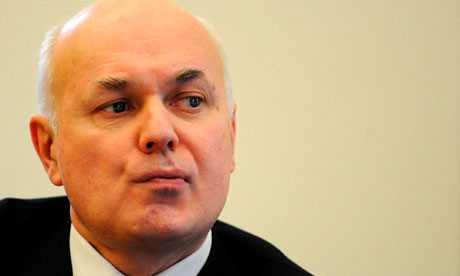DWP employees criticise environment of poor management and high stress in leaked internal survey

Universal Credit is the brainchild of Iain
Duncan Smith, the work and pensions secretary. Photograph: Ian
Nicholson/PA
Staff working on the
biggest shakeup of the welfare state in its
history have described the project as "soul-destroying" and "unbelievably
frustrating", with some saying they are under so much pressure that they can
only engage in "firefighting and panic management".
A leaked internal survey of
scores of Department for Work and Pensions (DWP) employees working on the
government's flagship Universal
Credit programme describes an environment of poor management and high levels
of stress. Labour said the survey was "utterly damning".
Universal Credit (UC) – the
brainchild of Iain Duncan
Smith, the work and pensions secretary – seeks to streamline and integrate
benefit payments for millions of claimants. It is a huge IT project that has
been hit with a number of setbacks in recent months.
Taking a direct swipe at managers, another civil servant says: "I have never worked somewhere where decision making was so apparently poor at senior levels … and communications from that level was totally nonexistent. This programme should be a case study for how not to engage with your people to get the most out of them."
In an email to programme staff on 23 July, the business change director, a senior civil servant, admits that the initial findings from the survey revealed that there was "much room for improvement".
"We received some very honest comments, which is exactly what we need if we are truly going to address your concerns and make things better … Many comments focused on communication – colleagues were unclear about both their role and future plans for UC. There were also a significant number of comments about senior leadership and the culture within UC.
"Clearly there is much room for improvement and we are starting from a pretty low base. However, without this honesty it would be much harder to tackle positively and move forward. With your help we will do all we can to make Universal Credit the great place to work that we all want it to be."
The report found that 68% of employees responded to the survey. The highest ratings came from staff who said they were "treated fairly and without discrimination". However, the lowest ratings were given when staff were asked if "senior leaders listen to my concerns and act on them" and "I understand the programme vision for UC and what success looks like".
Comments included: "After 29 years of service this has been the most soul-destroying work I have done," and: "There is too much dishonesty and no one ever admits to making a mistake."
Another said: "This is the third review in 16 months, no rollout plans, no confidence in going forward and stakeholders losing confidence in our ability to deliver."
One respondent to the survey complained that stress was damaging people's health.
The shadow employment minister, Stephen Timms, said: "These testimonies from the heart of the Universal Credit programme are utterly damning. No strategic leadership, no plan, no idea. The scheme is in chaos.
"The truth is Universal Credit is in crisis and everyone knows it. It's time for Iain Duncan Smith to admit this project is in deep trouble, come clean about how bad things are, and ask for help, because if things stay as they are this flagship will sink – taking hundreds of millions of pounds of public money with it."
Mark Serwotka, general secretary of the PCS union, which represents 80,000 civil servants in the DWP, said: "Universal Credit is defining Iain Duncan Smith's time as work and pensions secretary, lurching from crisis to crisis and showing the failings in the government's obsession with ideology over proper investment and support for people who are out of work. The views of the staff could not be clearer and they really must be listened to."
The DWP acknowledged that its staff had raised important issues and said that a new management team had been put in place following the death of Philip Langsdale last year.
A DWP spokesperson said: "Universal Credit is in a new phase following the successful early launch in Greater Manchester and the announcement of how the new benefit will roll out across the country from October.
"A new management team with clear strategic leadership is in place led by Howard Shiplee, one of the UK's leading experts in delivering major projects including the Olympic Park. As a part of this, we are working with staff to understand the issues they were facing, just as any responsible employer would."
In
April the department announced that the national launch of UC would be
limited to a few hundred users in one small claimant district in the
north-west of England. Then in the following month a Cabinet Office review of
all major Whitehall projects put an "amber-red"
warning on UC – designating it as a project in danger of failing.
Duncan Smith defended
the more limited rollout process, claiming that the government was learning
from Labour's mistakes and wanted to build up user volumes slowly and
carefully.